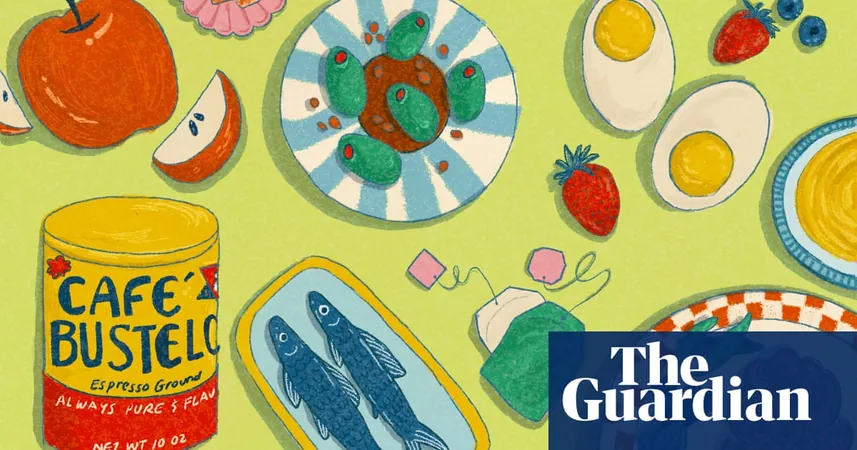
I Tried an Anti-Inflammatory Diet for a Week: Surprising Insights and Tips for Success!
2024-11-22
Author: Ling
Inflammation is a term we often hear, but its connection to our diet can be clouded with confusion. When I decided to take on the challenge of an anti-inflammatory diet for a week, I discovered it’s less about strict rules and more about embracing a lifestyle that promotes health. According to Julia Zumpano, a registered dietitian at the Cleveland Clinic, anti-inflammatory eating resembles a Mediterranean diet – emphasizing whole grains, vibrant vegetables, and wholesome fats while bidding farewell to processed foods.
What is Inflammation?
Inflammation can be categorized into two types: acute and chronic. Acute inflammation occurs as a protective response to injury, promoting healing much like emergency services responding to a crisis. However, the chronic inflammation researchers are concerned about has become increasingly common in modern society. This ongoing state of emergency within the body is linked to various serious health issues, including autoimmune disorders, heart disease, and some cancers. Alarmingly, chronic inflammation doesn’t just affect the elderly; youth in the U.S. are seeing rising rates of inflammatory bowel disease and other inflammation-related conditions.
Symptoms of chronic inflammation can be elusive—ranging from joint pain and brain fog to mood disorders—making awareness crucial. Diet plays a pivotal role, with certain foods acting as triggers. Dr. Christopher Damman highlights that sugar, trans fats, refined carbs, and ultra-processed foods contribute significantly to inflammation.
The Diet's Essentials
As I embarked on my week-long journey, I learned that an anti-inflammatory diet doesn’t have to be complicated. It starts with fiber-rich foods that support gut health, such as whole grains, beans, fruits, and vegetables. Aiming for 25-30 grams of fiber and minimizing added sugars can set a solid foundation.
Probiotic-rich foods, omega-3 fatty acids found in fish and seeds, and antioxidant-loaded fruits like berries are crucial components of this diet. The insightful Dr. Qianzhi Jiang pointed out that the relationship between food and inflammation is not merely about avoidance but about making conscious choices.
My exploration included experimenting with various meals, like a Japanese-inspired breakfast of boiled eggs and kimchi, or hearty dinners featuring omega-3-rich salmon or bison bolognese.
The Surprising Role of Salt and Meat
While indulging in salted snacks felt okay in the moment, I discovered that excessive salt can be inflammatory. Likewise, understanding the nuances of meat consumption proved enlightening. The inflammatory potential lies not in the meat itself but in the saturated fats it contains, particularly in processed meats.
For the best health outcomes, choosing lean cuts and cooking methods that avoid high temperatures can mitigate risks. Techniques like baking or poaching become not just culinary preferences but pivotal health decisions.
Maintaining Balance
Throughout the week, I tried to stick to an 80/20 rule with my food choices – enjoying semi-indulgent treats with a focus on keeping 80% of my meals anti-inflammatory. This approach not only eased the pressure of perfection but also helped cement the dietary changes into a sustainable lifestyle.
Social situations posed challenges. One evening, faced with movie snacks loaded with sugar and salt, I indulged momentarily, yet learned that flexibility is key in steering clear of guilt. According to Zumpano, it’s vital to view dietary efforts as a long-term strategy rather than a temporary fix.
Beverage Choices Matter
Hydration plays a role too. My drink of choice became unsweetened green tea and ginger-infused options to tap into their anti-inflammatory properties. Even coffee, a staple for many, emerges as a significant source of antioxidants.
Conclusion: Is It Easy?
An anti-inflammatory diet is, at its essence, a commitment rather than a momentary endeavor. Yes, challenges arise, but the benefits—managing inflammation and enhancing overall health—are worth the effort. So, if you desire to revamp your eating habits, embrace the journey with open eyes—after all, a week of conscious eating can lead to transformative changes. It’s about eating vibrant, nourishing foods, allowing yourself some leeway, and diving into a healthier, more mindful lifestyle. Ready to start your own anti-inflammatory adventure? The time is now!



 Brasil (PT)
Brasil (PT)
 Canada (EN)
Canada (EN)
 Chile (ES)
Chile (ES)
 España (ES)
España (ES)
 France (FR)
France (FR)
 Hong Kong (EN)
Hong Kong (EN)
 Italia (IT)
Italia (IT)
 日本 (JA)
日本 (JA)
 Magyarország (HU)
Magyarország (HU)
 Norge (NO)
Norge (NO)
 Polska (PL)
Polska (PL)
 Schweiz (DE)
Schweiz (DE)
 Singapore (EN)
Singapore (EN)
 Sverige (SV)
Sverige (SV)
 Suomi (FI)
Suomi (FI)
 Türkiye (TR)
Türkiye (TR)